
Guruvayurappan also rendered as Guruvayoorappan, is a form of Vishnu worshipped mainly in Kerala, India. He is the presiding deity of the Guruvayur Temple, who is worshipped as Krishna in his child form, also known as Guruvayur Unnikkannan. The temple is located in the town of Guruvayur, Thrissur, Kerala, which is named after the deity.
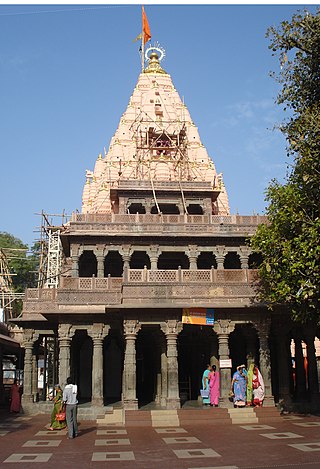
Mahakaleshwar Jyotirlinga is a Hindu temple dedicated to Shiva and is one of the twelve Jyotirlingas, shrines which are said to be the most sacred abodes of Shiva. It is located in the ancient city of Ujjain in the state of Madhya Pradesh, India. The temple is situated on the side of the holy river Shipra. The presiding deity, Shiva in the lingam form is believed to be Swayambhu, deriving currents of power (Shakti) from within itself as against the other images and lingams that are ritually established and invested with mantra-shakti.

Amrithakadeeswarar Abhirami Temple (also called Abhirami temple is a Hindu temple dedicated to Shiva in his manifestation as Kalantaka and his wife Parvati as Abhirami. There is a Shrine for Maha Vishnu as Amrithanarayana and his consort Mahalakshmi as Amrithavalli. It is located in Thirukkadaiyur, 21 km East of Mayiladuthurai, Tamil Nadu in India. This temple is associated with the legend of Shiva saving his young devotee, Markendeya from death, and the tale of a saint, Abirami Pattar a devotee of the presiding goddess.

Arunagirinathar was a Tamil Shaiva saint-poet who lived during the 14th century in Tamil Nadu, India. In his treatise A History of Indian Literature (1974), Czech Indologist Kamil Zvelebil places Arunagirinathar's period between circa 1370 CE and circa 1450 CE. He was the creator of Tiruppukal, a book of poems in Tamil in praise of Murugan.

Manakanchara Nayanar, also known as Manakkanychaara Nayanar, Manakkancharar, Manakanjara Nayanar, Mankkanjara Nayanar and Manakkanjarar, was a Nayanar saint, venerated in the Hindu sect of Shaivism. He is generally counted as the twelfth in the list of 63 Nayanars. Like other Nayanars, he was a fervent devotee of the god Shiva. Manakanchara Nayanar is dated to the 8th century and was a contemporary of Eyarkon Kalikkama Nayanar, a Nayanar saint and his son-in-law as well as Sundarar. He is described to have cut his daughter's hair and given it to Shiva disguised as a Shaiva ascetic, on her wedding day.

The Vilwadrinatha Temple is a Hindu temple in Thiruvilwamala, a town in the city of Thrissur, Kerala, India. The principal deities are Rama, the seventh incarnation of the god Vishnu, and his brother, Lakshmana. It figures among the Abhimana Kshetrams in Vaishnavite traditions. This is one of the four major Rama temples in Kerala — the other three are in Thriprayar, Kadavallur, and Thiruvangad. The temple houses an idol of Lakshmana, which is rare in India. Vilwadrinatha Temple is located in the centre of the community of Thiruvilwamala, atop a 100-foot-high hillock. Visible from the temple is Bharathappuzha, the second-largest river in Kerala, which flows past the temple's northern side from around 3 kilometres away.
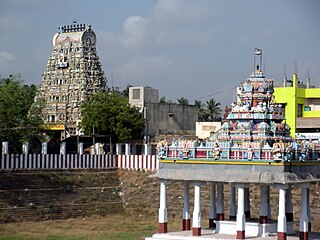
Thyagaraja Temple is a Hindu temple dedicated to Hindu god Shiva. It is located in Tiruvottiyur in the northern part of Chennai, Tamil Nadu, India. The temple is revered by the Tevaram hymns of Saiva nayanars, the 7th century Tamil saint poets and classified as Paadal Petra Sthalam. All the Three of Thevaram Moovar has rendered Thevaram songs in this temple. The temple is closely associated with the saint poet Sundarar and Pattinathar. The temple has been in vogue from the Pallava times of the 7th century and widely expanded by Chola kings during the 11th century. The temple has a seven tiered gateway tower, a tank, with the overall temple area covering 1 acre. The temple is administered by the Hindu Religious and Endowment Board of the Government of Tamil Nadu. The temple draws parallel with the Thygaraja temple in Tiruvarur as both the temples were expanded by Rajendra Chola I and both have the same dance poses of Shiva. The temple is one of the 51 Sakthi Peetams in the country.
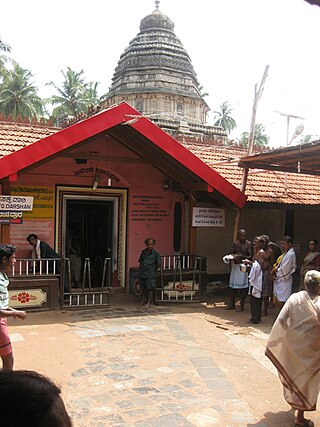
The Mahabaleshwar Temple, Gokarna is a 4th-century CE Hindu temple located in Gokarna, Uttara Kannada district, Karnataka state, India which is built in the classical Dravidian architectural style. It is a site of religious pilgrimage. The temple faces the Gokarna beach on the Arabian Sea. The temple deifies the Pranalinga also called Atmalinga or Shiva Linga In legend, it is said that the deity of the temple will bestow immense blessings to devotees, even to those who only glimpse it. Currently the administrative charge of the temple is with an Overseeing Committee under the Chairmanship of Justice BN Srikrishna, a Retired Justice of the Hon'ble Supreme Court of India. It is one of the 275 paadal petra sthalams expounded in the Tevaram, a sacred Tamil Shaivite text written during the 6th and 7th centuries by 63 saints called Nayanars.
Pattinathar is a name identified with two different Tamil individuals, one of 10th century AD and another of 14th century AD.
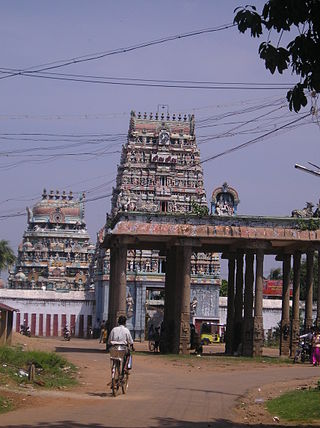
The Masilamaniswara Temple, Thirumullaivoyal or Masilamaniswara Temple is a Hindu temple dedicated to Shiva located in Thirumullaivoyal in the Chennai-Avadi road, India. The temple is incarnated by the hymns of Tevaram and is classified as Paadal Petra Sthalam. The temple is incarnated by the hymns of Sundarar, Ramalinga Swamigal and Arunagirinathar. His consort Parvati is depicted as Piraisoodi Amman. The presiding deity is revered in the 7th-century Tamil Shaiva canonical work, the Tevaram, written by Tamil saint poets known as the nayanars and classified as Paadal Petra Sthalam.
Dandi Adigal Nayanar or Dandiyadigal Nayanar is the 31st Nayanar saint. Traditional hagiographies like Periya Puranam and Thiruthondar Thogai describe him as a great devotee of the Hindu god Shiva.

Pachaimalai Arulmigu Subramanya Swamy Temple, also known as the Pachaimalai Balamurugan Temple, is one of the two major hill temples located in Gobichettipalayam, Tamil Nadu, India. The temple is dedicated to the Lord Murugan. The temple is constructed in the Tamil style of architecture and is located on top of a small hillock in the outskirts of the town of Gobichettipalayam near Pudupalayam, Tamil Nadu. Here, Kartikeya is venerated as Balamurugan or Subramanya Swamy.
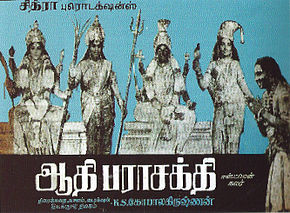
Aathi Parasakthi is a 1971 Indian Tamil-language Hindu mythological film directed by K. S. Gopalakrishnan and produced by Chitra Productions. It stars S. Varalakshmi in the title role, Gemini Ganesan and Jayalalithaa. Sridevi acted as a child artist in the movie, while Padmini came in for a cameo. The film was dubbed in Hindi as Jai Jagat Janani (1976).

Sakkiya Nayanar was a Nayanar saint, venerated in the Shaiva sect of Hinduism. He is generally counted as the thirty-fourth in the list of 63 Nayanars. He was a Buddhist, who converted to Shaivism.
Eyarkon Kalikkama Nayanar, also known as Kalikkamanar, Kalikamba Nayanar, was a King of Haihaya (Eyar), Commander-in-chief of the Chola army, a Nayanar saint, venerated in the Hindu sect of Shaivism. He is generally counted as the 29th in the list of 63 Nayanars.
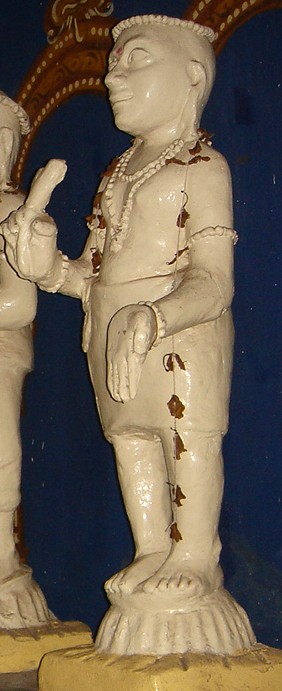
Eripatha Nayanar, also known as Eripathar, Eripatar, Eribattar, Eripattan', Eripaththa Nayanar and Eripattha Nayanar, is Nayanar saint, venerated in the Hindu sect of Shaivism. He is generally counted as the eighth in the list of 63 Nayanars.

Iyarpagai Nayanar, also known as Iyarpagaiar, Iyarpahai Nayanar, Iyarpagaiya Nayanar and Iyarppakai Nayanar is a Nayanar saint, venerated in the Hindu sect of Shaivism. He is generally counted as the third in the list of 63 Nayanars.
Pattinathar is a 1936 Indian Tamil film written and directed by T. C. Vadivelu Nayakar and produced by M. T. Rajan. Music by Gopal Sharma is an added asset to the film. The film stars M. M. Dandapani Desikar playing the titled role with other actors like V. N. Sundaram, D. R. Muthulakshmi, T. K. Rukmini, M. S. Radhabai and P. G. Venkatesan portraying supporting roles. The film was a major success, and ran for 25 weeks and established Desikar as an excellent singer - actor on the ladder of success. Pattinathar is about saint who lived in Kaveripoompattinam, his devotion to Lord Shiva and the miracles the saint performed.
Varadharaja Perumal temple is a Vishnu temple located at Kaladipet in Thiruvottiyur. This temple is located near Thyagaraja Swamy temple, Thiruvottiyur. This temple was historically known as Padmapuram and is estimated to be 500 years old. Perundevi shrine is located left to that of the Lord. The shrines for Navagrahas are installed on a stage designed as lotus petal. Magizham tree is the Thala Virutcham of the temple and Vaikanasam is the pooja.
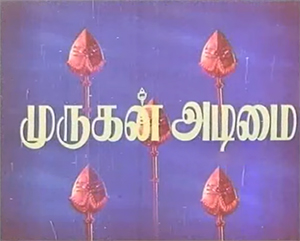
Murugan Adimai is a 1977 Indian Tamil-language devotional film starring R. Muthuraman, A. V. M. Rajan, K. R. Vijaya in lead roles with Nagesh, Major Sundarrajan and Thengai Srinivasan in supporting roles. The film was directed by R. Thyagarajan and released on 25 March 1977.














